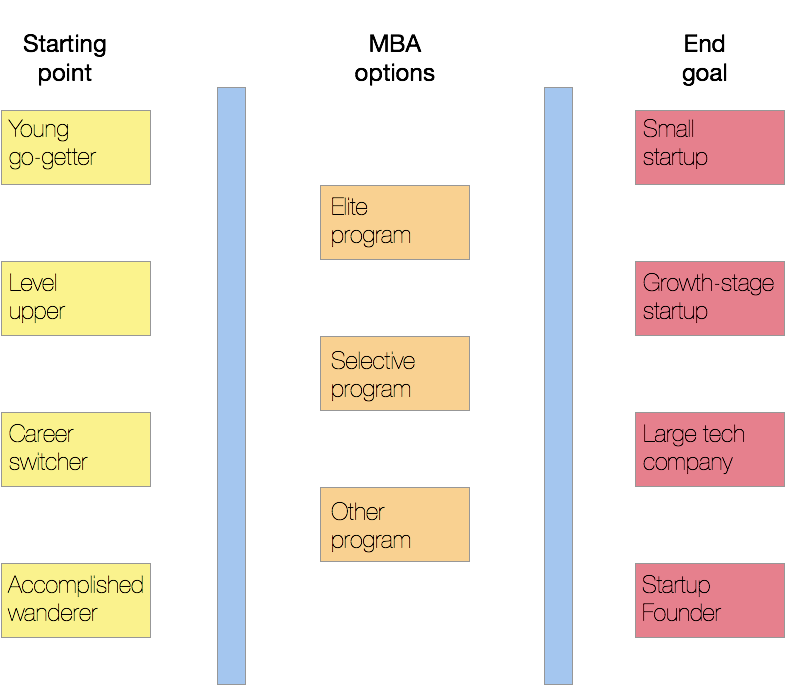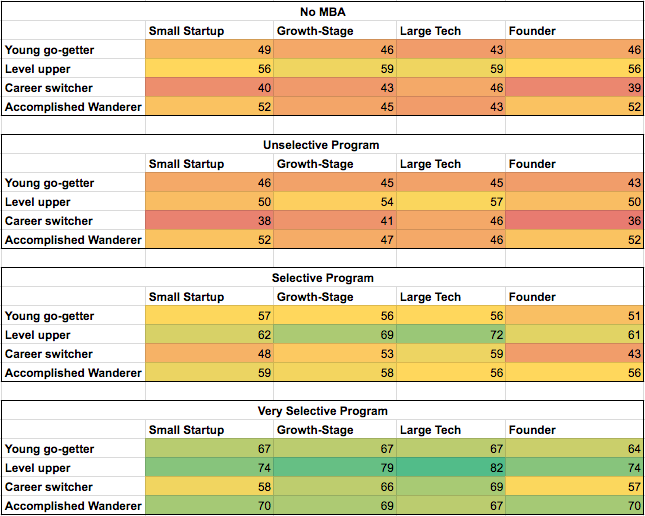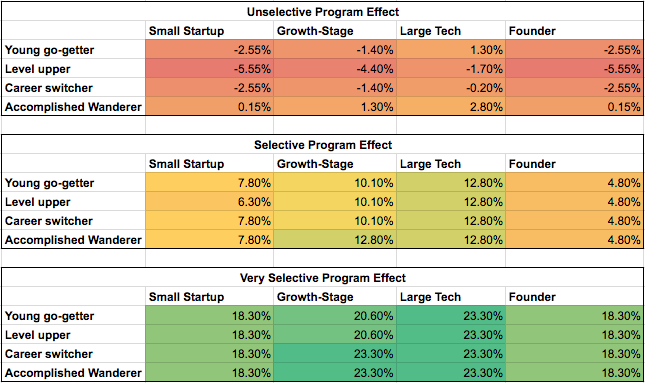Will an MBA help you get ahead in tech?
One problem with taking advice from the internet is that the advice-giver doesn’t know you or your goals. This means he’ll likely substitute his own status and aspirations for yours. If you aren’t aware of this when following the advice, you can get steered in the wrong direction...

I get this question a lot. It’s understandable why people are confused. Every year or so, the classic “do-MBAs-have-any-value-in-tech” debate will flare up. It usually goes something like this:
Step 1. An industry luminary launches a late-night tweet destined to irritate MBA grads
One reason there are so few really big startups founded by MBAs is that MBAs don't do side projects.
— Paul Graham (@paulg) April 13, 2017
Step 2. An MBA grad, often from an elite program, fires back with a defense citing MBA success stories.
HBS MBAs '09-10 started @thredUP @RenttheRunway @Cloudflare @blueapron @plated @birchbox @AdoreMe @ToughMudder. $5-10B of market cap there.
— Alex Taussig, Lightspeed (@ataussig) April 13, 2017
Step 3. Many people are left wondering whether they should ditch their GMAT prep book and plow their tuition money into starting a company.
For those of you considering an MBA, I’d like to offer a more systematic way to think through the decision. To start, though, I should explain what even qualifies me to weigh in:
- I’m a satisfied graduate of the Stanford GSB and happily employed in startup land
- The startup I work for, Tradecraft, provides an alternative path for smart people who want to break into tech
- In my job, I advise lots of people on their career goals and different paths to achieve them.
The point of this article is not to offer another opinion on whether an MBA is a smart career move. Instead, I want to walk you through how to think through this decision based on who you are and what you want.
Framing the problem
One problem with taking advice from the internet is that the advice-giver doesn’t know you or your goals. This means he’ll likely substitute his own status and aspirations for yours. If you aren’t aware of this when following the advice, you can get steered in the wrong direction.
For example, an MBA might be a great idea for a Harvard econ major who wants to get into private equity. It may be a lousy idea for someone who’s already in debt from paying their way through college.
While I can’t know everything about you and what you want, I can make some assumptions and give you a framework to walk through the problem. Here’s how we’ll tackle it:
- Where do you want to go?
- What you’ll need to get there
- Where are you starting from?
- Options for getting there
- How an MBA can help
- What it will cost you
Let’s dive in, shall we?

1. Where do you want to go?
Unless you have an idea of where you want to end up in your career, it’s hard to determine which path is best. To illustrate, imagine you’re choosing what city to live in. You could move to New York or Los Angeles. Which is a better option? It depends on your goals. If you want to build a career in finance you might give New York more points. If you’re trying to become a TV writer, LA would score higher.
This may sound like common sense, but lots of people decide to go to school or take a job without being able to articulate why.
Of course, an MBA can be your end goal in itself. Maybe you just want to make new friends, learn for the sake of learning or make your parents happy. While there may be cheaper ways to accomplish most of these goals, it doesn’t mean they aren’t valid reasons.
Your goal also doesn’t need to be set in stone. One of the benefits of getting an MBA is the time to explore different career paths. That said, if you go into business school without at least a hypothesis of what you want to do, you risk wasting time and money, which can limit your future career options (more on this later).
Since you’re reading this post, I’m going to assume that you already know you want to build a career in tech. The question you may be asking is what kind of company/role best suits you. Here are four common paths to build a career in tech:
- Work at a small startup (Angel funded-Series A) — Enjoy the camaraderie of working on a small team and solving problems without an existing playbook. If you and the company are successful, you’ll advance much faster than at a larger company.
- Work at a growth-stage startup (Series A-Series D) — Experience the frenetic pace that comes with scale and the talent it attracts. If you’re able to help one of these companies scale to greatness you’ll have a brand halo that will follow you for the rest of your career.
- Work at a large tech company (Series D-Post IPO) — Sleep easy knowing that your company isn’t on the brink of dying. Joining a large tech company can give you the chance to scale your impact to millions of users, and learn best practices from a tested playbook.
- Start your own company — Get the chance to grow as a person and make impactful decisions. While you know it won’t be easy you’ve got a product in your head that needs to exist in the world.
2. How you’ll be measured
To land your ideal job it helps to know how companies measure candidates. No matter what role you want, you should expect to be evaluated based on your: education, experience, aptitude, attitude and network.
Note: This isn’t how every hiring manager thinks about assessing talent. Rather, these categories encompass almost everything that hiring managers care about.
While these words may sound familiar, it helps to define them in the context of hiring:
Education — What you know and what you can do
Breaks down into:
- Years of school
- School Reputation
- Concentration
- Performance (GPA)
How it’s measured: Larger organizations have algorithms that assign scores based on your degree, concentration, and school ranking. Smaller companies tend to leave this assessment to a hiring manager.
Experience — How long you’ve been applying your knowledge and in what contexts
Breaks down into:
- Years of work
- Functional relevance
- Industry relevance
How it’s measured: Hiring managers can often get a sense of this by screening your resume. If a candidate seems promising, they’ll often ask for more detail during the interview.
Aptitude — How quickly you can process and learn new information
Note: while you can break aptitude down, very few companies do this so I’ll skip it here.
How it’s measured: Orgs often use signals from selective organizations like Harvard or McKinsey to estimate a candidate’s aptitude. In the interview process, some companies will ask consulting-style case questions to see how a candidate solves problems.
Attitude — How easy are you to work with?
Breaks down to:
- Work ethic
- Grit
- “Culture fit” (how similar are you to us)
How it’s measured: Most companies will rely on referrals to learn about a candidate’s attitude. Interviewers ask behavioral questions (“tell me about a time when…”) Some companies may bring a candidate into a social setting to see how she bonds with the rest of the team.
Network––What kind of relationships can you offer the company?
Breaks down into:
- Who you know
- How long you’ve known them
- How well you know them
How it’s measured: Hiring managers will determine this based on how you got introduced to the company. They will also take cues from the previous companies and schools that you’re affiliated with.
For each type of opportunity, these criteria will be weighted differently. Based on experience, as well as some input from others, I imagine the weightings would look something like this:

Next, I’ll explain my reasoning behind this chart:
Small Startup
Attitude (30%) At a small company, a single employee can have a big effect on the productivity of the team (for better or worse). Knowing this, many founders prioritize attitude above all else when making early hires.
Aptitude (27%) As the company searches for product/market fit, employees must constantly learn new topics and skills. Those with a lot of mental horsepower tend to be better equipped for the necessary rate of learning.
Experience (23%) Startups need employees who can hit the ground running on day one. The more relevant experience an employee brings, the less effort it takes to get her to a productive state.
Education (15%) Since most startups are still figuring out how to build a repeatable machine to make money, specific knowledge is less valuable.
Network (5%) A strong network probably won’t be the reason an employee gets hired (unless the role is something like partnerships). That said, the ability to entice employees, advisors, and investors to a growing team can be a big value-add.
Growth-Stage Startup
Experience (30%) Once a startup has found product/market fit, it needs to quickly reach and serve lots of customers. Hiring managers will prioritize candidates who have faced similar challenges and can help the company avoid costly mistakes.
Aptitude (22%) As a company scales lots of systems will start breaking. Growth-stage companies need people who can work on fixing systems rather than simply working within their constraints.
Attitude (20%) The company is getting large enough where a single bad hire can’t take down the ship. With new layers of management and more sophisticated HR systems in place, problems can be more easily dealt with.
Education (20%) Education becomes more valuable as the company’s needs become clearer. While growth stage companies do care about this, it won’t make or break a candidate’s application.
Network (8%) At a faster-growing company, hiring becomes a much higher priority. While a candidate’s network alone still won’t land her the role, it may help her get promoted to a management role.
Large Tech Company
Experience (27%) At scale, mistakes can have a much larger impact on users and employees. Larger tech companies need employees who can recognize patterns and avoid these traps.
Education (22%) Most roles at large companies have an existing playbook to work from. These orgs want employees who can come in knowing how to run and optimize it.
Aptitude (20%) With fewer unknowns to solve and more layers of management to offer support, the ability to learn fast becomes less critical.
Attitude (18%) Since attitude is the most subjective of these attributes, larger companies often create systems to de-prioritize it. For example, having hiring committees ensures this factor isn’t given too much weight.
Network (13%) Large companies offer more opportunities for management. With this title comes the responsibility of growing a team. Having a network that can make good referrals can make the job quite a bit easier.
Founder
Attitude (25%) You lose a big customer. Your best employee defects to a competitor. An investor declines to provide follow-on funding. Being a founder means staying resilient in the face of countless obstacles while keeping a brave face for the rest of your team.
Aptitude (22%) To build a big business you need to to see opportunities that others don’t. The ability to learn quickly, in the face of uncertainty, is essential for getting your startup off the ground.
Experience (20%) Small startups are always on the brink of death. Mistakes can be costly. Enough of them can sink the company. Experience can allow a founder to avoid common mistakes and give their company a higher likelihood of survival.
Network (18%) Most of the job of a non-technical founder is recruiting employees, investors, customers and partners to buy into a vision. Having relevant relationships makes that job much easier.
Education (15%) Since it’s not yet clear what kind of product you’ll be building or what customer you’ll be serving, existing knowledge is less important.
It’s not essential you agree with me on these weightings. In fact, you should probably make adjustments depending on the industry or function you’re targeting. What’s important is that you have an understanding of what your ideal company cares about and how they’ll measure you.
3. Where are you starting from?
Now that you know what you’ll need to reach your goal, let’s determine where you’re starting from.
Since I can’t take into account all the nuances of your life, I’ll generalize with some common job-seeker personas.
- Young go-getter — You recently or are just about to graduate from college. You’re set on breaking into tech and looking to spend your twenties making the largest impact possible.
- Level-upper — You’ve been working in tech for at least a couple years and find yourself dissatisfied by your rate of career growth. For your next role, you want to move into management or switch to a completely different function.
- Career Switcher — You’ve spent your early career in a non-tech industry you’re now ready to leave. Maybe it’s consulting, finance, law or a bigger corporation. Either way, you’re looking to break into tech and scale your abilities to make a bigger impact.
- Accomplished Wanderer — You’re a smart person who’s taken a non-traditional path. Perhaps you’ve jumped around between careers and industries or maybe started a company of your own. Now you’re looking to formalize your career path to find something more stable.
Hopefully at least one of these profiles resonated with you. Don’t worry if you were somewhere in between. I’m about to get more explicit about how each persona might score on the different criteria. After reading through my assumptions, you’ll be able to make adjustments.
Young go-getter
Attitude (6/10) Silicon Valley has a soft spot for young ambitious people. If you’ve attempted something hard like starting a company or paying your way through school, you may get extra points for grit.
Aptitude (5/10) It’s hard to estimate how fast of a learner you are. If you master new concepts quickly give yourself a couple extra points. If you struggle compared to your peers subtract a couple.
Education (5/10) Give yourself a higher score if your university was very selective, if your degree was highly technical or analytical, or if your GPA was particularly high. An un-selective school or a liberal arts degree will likely dock you a point or two.
Experience (3/10) Since you’re a recent graduate, you’ll have a tough time selling yourself on experience. If you were lucky enough to have an internship in tech give yourself an extra point. Another point if it was relevant to your ideal role or industry (Health tech, Education, etc.).
Network (3/10) While you made some great friends in college, it’s unlikely that many of them are super connected in the startup world yet.
Level Upper
Attitude (6/10) You’re fairly well indoctrinated into tech culture. While you may not have the hustle that you had post-graduation, you’ve managed to improve based on feedback from managers. If you’re finding yourself burnt out or frustrated by your role, it’s likely your attitude has taken a dip and you may get docked points.
Aptitude (6.5/10) You’ve already spent some time in tech and impressed previous hiring managers so you’re probably sharp enough to impress another.
Education (5/10)
While your education may be given less weight, it will likely be scored the same. Give yourself a higher score if your university was very selective, if your degree was highly technical or analytical, or if your GPA was particularly high. An un-selective school or a liberal arts degree will likely dock you a point or two.
Experience (6/10)
Hiring managers are risk averse creatures. Many are looking for a candidate who’s been in the same role at a similar-sized company in a related industry. The more of those things you’re attempting to change, the fewer points you’ll benefit from your previous experience. It also helps if you come with a brand halo from a company that was both successful and well-known.
Network (5/10) After spending a few years in the industry, you’ve managed to build some close relationships with co-workers. Meanwhile, your classmates have built careers of their own. If your network includes a good number of high-level mentors (investors, executives) give yourself a couple extra points.
Career Switcher
Attitude (4/10) While you’re more professional than many folks in tech, you’ll probably have some trouble fitting in. Your previous industry had a more formal culture and rigid hierarchy. If you’re making this change later in life or come from an industry that didn’t value technology expect that you’ll have a steep learning curve.
Aptitude (5/10) Since career switchers come from so many types of industries, it’s useless to make guesses about aptitude. If you’ve been in environments with lots of smart people and managed to hold your own, give yourself a couple extra points.
Education (5/10)
While you may have gone through extensive training at law school or med school, don’t expect it to help you much. Like before, selective schools, relevant degrees, or better performance will give you more points.
Experience (4/10)
Most employers have trouble translating experience from outside the industry. If your previous role has a strong skillset correlation with your new one (finance and growth or architecture and design) or demonstrates business acumen(management consulting) expect to earn extra points. Having 1–4 years of experience may be seen as a benefit, demonstrating that you know how to last inside an organization. Over 4 years will likely offer diminishing returns (if not be seen as a negative). Management, strategic or leadership experience is usually seen as beneficial.
Network (2/10) While you may have an existing network, it’s unlikely you know many investors or potential employees for your future company. If you’ve managed to build a strong network in a relevant industry sometimes that can be a unique advantage. But outside of that, you’re likely not starting with much.
Accomplished Wanderer
Attitude (5/10) You’re a hard worker who’s burnt out from carving your own path. If you’re used to working on your own or in a small team, you might have some difficulty assimilating with a new group. That said, if you can get your mojo back it may be very valuable to your new team.
Aptitude (6/10) To make a living without the support systems of a larger company, you’ve had to become relatively self-reliant. That said, you’ll need to get in a room with some other smart people so you have something to compare yourself against.
Education (5/10) If you’re in this bucket it’s likely you haven’t picked up much of a brand halo from previous opportunities. That means the brand of your school may be what hiring managers use to contextualize your background.
Experience (5/10) Very case dependent. Extra points if you started a successful tech or tech-enabled business or managed a team. Like before the more relation your previous role has to the one you want next, the more a hiring manager will be to rate you highly.
Network (4/10) Your network probably reflects the industry you just left. If it was adjacent to tech, give yourself a couple extra points. If it wasn’t, subtract a couple.
4. Getting from point A to point B
Obviously, an MBA isn’t the only way for you to make progress in your career. Before I dive into the value of different types of MBA programs, it’s important to highlight your other options.
- Start from the bottom and work your way up — Get an entry-level job or internship at the organization you want to join and work your way up. While it may take a long time to get where you want, you’ll at least have your foot in the door. It’s worth noting that this gets harder as a candidate gets older.
- Get a technical degree from a university––Degrees like computer science and human-computer interaction are common in tech. While the skills you’ll learn will be different from what’s taught in b-school, the time commitment and cost are similar.
- Immersive Program — These programs (like Hack Reactor or Tradecraft) are optimized for quickly closing a skills gap like coding, design or marketing. While they cost less both in terms of money and time, they offer less optionality than an MBA.
- Do-it-yourself option — Thanks to the internet there is tons of free or low-cost learning content out there. If you have the time and the discipline you can create your own curriculum and find ways to put it to work.
- Find an apprenticeship — A cross between a formal internship and a do-it-yourself option. An apprenticeship allows you to observe someone who knows what they’re doing so you can build mastery. While rare in the tech industry, these can be worthwhile if you can convince someone seasoned to give you a shot.
Since you’re reading this post to understand the value of an MBA, I’ll spend the rest of this post focused on that path. However, I’ll try to add in recommendations for these other options when it feels appropriate.
Not all MBA programs are created equal
This may sound elitist but it’s hard to offer good advice without stating it.
As you saw at the beginning of this post, the tech industry has mixed feelings about business schools and the people who attend them. While some MBA programs are seen on a resume as a value-add, others are seen as neutral or even a detractor. This has less to do with the actual differences in quality between the programs and more to do with industry perception and the quality of the network.
For the sake of this post, I’m going to separate potential MBA programs into three paths:
Very-Selective Programs––These are the 5–10 programs that everybody’s heard about. The ones at the top of every publication’s list with single or low-double digit acceptance rates. With their renowned reputations, people often joke that the hardest step to graduating from one of these schools is getting in.
Selective Programs — These are quality business schools that have a selective admissions process, but not everyone knows them by name. Many have a specific industry specialization and most are far away from well-known startup hubs.
Un-selective Programs — You can usually recognize these schools by their advertisements. Many are for-profit or online colleges that require very little from the applicant to gain acceptance.
While the lines that separate one program from another are somewhat blurry, the perceived differences will have a substantial impact on your future.
5. Weighing the benefits

Depending on how selective of a school you choose, you should expect to see differing amounts of benefit in each category:
Very Selective Program
Elite programs like HBS or GSB provide as much (if not more) value from the selectivity of their admissions process than from the program itself. Knowing the gauntlet students must go through for admission, employers tend to assume that grads of these programs are smart and accomplished before even meeting them.
Another effect of this filter is a given MBA class at a very selective school will be filled with bright and well-connected people. Students who make the effort to build relationships with their classmates can end up connected to future co-founders, teammates, investors, and partners.
The actual curriculum at these institutions is pretty similar to less selective programs. In fact, many top schools prefer their professors to spend time producing research rather than teaching and updating curriculum. To remedy student complaints, many programs have supplemented their teaching staffs with seasoned industry practitioners. These instructors can be very effective at teaching higher-level skills like strategy and management but are less helpful when teaching hard skills since they haven’t had to apply them for years.
In general, business schools are well-suited to teach soft-skills like management that change slowly and need human interaction to master. For skills that are constantly changing like design or marketing, MBA programs are not built to stay up to date.
- Aptitude (+2) — This won’t actually improve but people’s perceptions may be altered
- Attitude (+1 or 2) — You’ll leave with more confidence– which can be a good or a bad thing. Any attitude changes will likely be more helpful the larger the company and the more MBAs they’ve hired.
- Education (+2 or 3) — You’ll be seen as more knowledgeable, but only when it comes to certain skills. The larger the company, the more they’ll value the MBA education.
- Experience (+2) —Assuming you use the Summer between first and second year to gain relevant experience (found a startup, join one, etc.)
- Network (+4) — If you go to a school near Silicon Valley (like the GSB) this score may be even higher
Selective Program
Without the admissions filter of an elite school, grads from selective programs must depend on hiring managers to be familiar with the quality of their school. This works when a company has already hired several alums from their program, but it’s far from guaranteed.
While grads of these programs still gain valuable relationships, they are often less helpful in the context of the tech industry. Proximity to a startup hub or a good engineering program nearby can help increase the value of a network. These same factors will also help determine whether the curriculum will be geared towards the tech industry. Being close to a startup hub means the school is more likely to get well-known mentors to come speak and teach. A solid engineering program will signal an interest in building products and starting companies.
Often, the biggest mismatch that comes from being far from a startup hub is the cultural one. There are too many anecdotes of MBAs bombing interviews due to a sense of entitlement. While this happens with grads from all types of MBA programs, those from elite programs may be able to make up for it in other areas. Silicon Valley types are far less forgiving of entitled MBA behavior when they haven’t heard of the school.
- Aptitude (+0) — Going to a typical MBA program is unlikely to change an employer’s perception of this
- Attitude (+1) — You’ll leave with more confidence– which can be a good or a bad thing. Any attitude changes will likely be more helpful the larger the company and the more MBAs they’ve hired.
- Education (+1 or 2) —Large companies will find value in your skills. Less so for growth-stage or small companies.
- Experience (+1) — If you are able to use the Summer between first and second year to gain relevant experience (found a startup, or join one) this can be a +2
- Network (+2) — If you go to a school near Silicon Valley this score may be higher
Un-selective Program
There are plenty of industries and geographies where having an MBA of any kind is seen as a benefit or even a necessity. This is not the case in tech. Outside of perhaps older larger tech companies, attending a non-selective school will not give you much of an advantage in Silicon Valley. In fact, having a non-selective school on a resume often implies that a candidate wasn’t smart or motivated enough to attend a higher-quality school. As unfair as this characterization may be, it’s worth stating.
- Aptitude (-1) — Attending one of these schools will not actually decrease your aptitude, however, it can certainly decrease an employer’s perception of it
- Attitude (+0)—Will probably not hurt unless it produces a chip on your shoulder.
- Education (+1)—Older large companies may find some value in the fact that you have an MBA, but this won’t be true for most.
- Experience (+1) — If you utilize the Summer between first and second year to gain relevant experience (found a startup, or join one) this can be a +2
- Network (+1) — If you go to a school near Silicon Valley this score may be higher
Now that we know how each company weights the various criteria, starting scores for the four personas and the effect of each type of program, we can insert the variables into each company’s hiring formula.

These numbers (which are out of 100) should give you an idea of how you’d score for each of these roles based on the program you attended.
One thing these numbers don’t account for is the other candidates you’ll be competing against. If the company you’re applying for is particularly hot, you may be competing against candidates who rank at 85 or 90. If the company is relatively unsexy or unknown, a lower score might be sufficient to land the role.
For our purposes, a slightly more helpful way to view the data is based on the percentage change to your score that will come from attending each program:

One thing that should stand out is the difference in the effectiveness of each program. While a selective program may only boost your score by 10%, a very selective program can lead to a 20% improvement. Enrolling in an un-selective program can actually leave you worse off than if you never attended in the first place.
6. Weighing the costs
Before you decide whether an MBA makes sense, it’s important to consider not just the benefits but also the costs.
The first and most obvious cost is money.
Accounting for tuition, living expenses, and books, a two-year residential MBA can cost between $100,000 and $200,000. If you don’t have that money, you’ll need to take on financial aid and/or loans. If you graduate with considerable debt, you will need to make enough money to cover your loans as well as your living expenses. In startup hubs like SF or NYC living expenses tend to be high. Going without a salary (as many founders do) or taking a low salary (as many early-stage startup employees do) may not be an option for you.
Even larger companies that are capable of meeting your salary requirements may not want to when if they can get someone nearly as qualified who will work for 75% of what you’re asking.
The opportunity cost for your time should also be taken into account. During those two years, you might have been building up a nest egg that could allow you to bootstrap your company. It’s worth keeping in mind, that the opportunity cost for those who attend an elite MBA program may be much higher (if you were able to get accepted into a very selective school, you likely could have gotten lots of other profitable job opportunities).
Another heavy cost of an MBA is time.
Enrolling in a two year MBA means you’re giving up all sorts of other options. Two years represents time that you could have spent mastering a skill, gaining relevant experience, or starting a venture of your own.
7. Wrapping up
For those of you who decided to skip this exceedingly long post to get straight to the answer, I’m sorry to disappoint you. An MBA is neither a good or bad option to build a career in tech. Whether it will be helpful for you depends on where you’re starting from, what kind of program you attend, and where you want to end up.
In general, my advice is: don’t get an MBA. Instead get an MBA from one of the very selective schools to help you fill a specific gap that you’ve specified beforehand.
If you’ve already enrolled in a program, go make the best of every moment. Learn what interests you, make close friendships, and expose yourself to new opportunities. Remember that what you get out of your education has more to do with you and your mindset than the school you’re attending.
